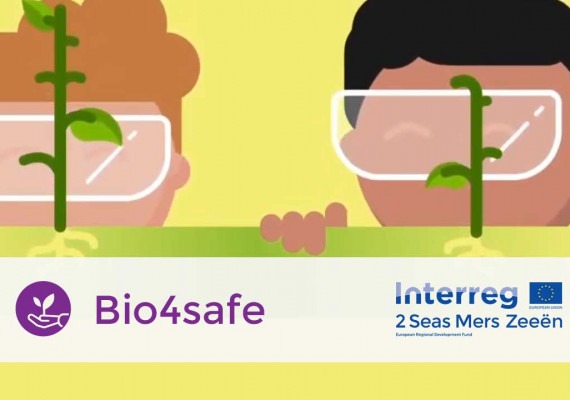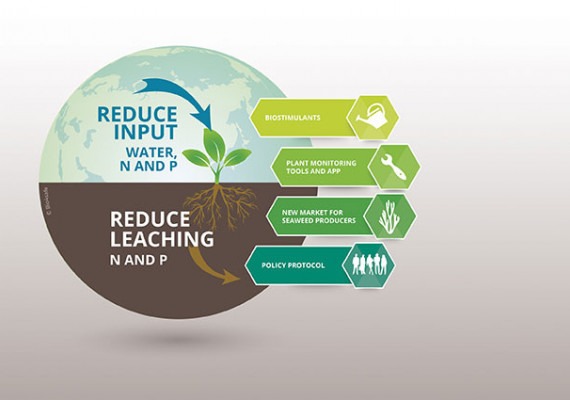Bio4safe
An innovative approach to enhance resource efficiency and safeguarding by using biostimulants and innovative sensors in horticulture
Priority Axis
Resource Efficient EconomySpecific objective
Efficient Use of Resources and Materials
Lead partner
Proefcentrum voor SierteeltContact
Begindatum
01/08/2017Einddatum
30/04/2022Project budget
3 100 828 €ERDF amount
1 860 497 €ERDF rate
60%Over
Common challenge
The 2 Seas area has the most intensive horticulture in Europe, with fertile lands producing the highest yields per ha, providing food and plants for people living in a highly densely populated area. Common efforts to increase agricultural yields in these regions was very successful over the last decade, but at a cost of increased resource use, such as water and fertilisers.
Europe has implemented regulations to safeguard surface water quality to reduce nutrient contamination, bringing attention to the land nutrient use as a threat to marine environments.
Phosphorus is becoming a scarce resource and irreplaceable component for our economy. Moreover, the EU only has a few domestic phosphorus suppliers and is therefore dependent on a few countries outside Europe that control these resources, some of which are not politically stable.
In 2015, Proefcentrum voor Sierteelt (Lead Partner) carried out a large survey amongst growers in the horticultural sector on the potential of biostimulants. This survey demonstrated that despite recent technological developments that lead to biostimulant products with the potential to reduce resource inputs - such as water and minerals - horticulturists have insufficient knowledge & experience to adopt these products widely. Growers were lacking a decision support tool in order to choose the correct products to increase water and fertiliser use efficiency. The horticulture sector urgently needed monitoring tools for plant growth and plant responses to grow in the most economically efficient way.
Substrate, seed and fertiliser-producing companies in the 2 Seas area were daily approached by biostimulant companies offering their products to be incorporated. Many products that were initially available on the market were of poor quality in the absence of a clear European legislation framework on biostimulants. This resulted in difficulties for users to choose appropriate products for use in commercial horticulture.
Overall objective
Main outputs
Cross border approach
Main Achievements
Thanks to 4 years of trials with sensors and biostimulants on a lot of different crops, the Bio4safe partnership was able to produce meaningful outputs for growers, policy makers, researchers and industry. They successfully reached their goals of showing that a reduction of 10% water and 20% of nutrient use in many horticultural crops can be achieved by using biostimulants and innovative sensors.
A biostimulant database was created, with scientific and objective trial results of biostimulants on different crops. This database is free, user friendly and can be used by growers to better decide what biostimulant is useful for their crop and cropping system. It can also be used by researchers to find related research and ideas for trials. This database contains the project’s own trials, but also all relevant, scientific and peer reviewed research that could be found.
Many external companies contacted project partners to inform whether their results could also be implemented into the project database.
Thanks to innovative sensor techniques, protocols for policy makers could be developed to help them set up trials with biostimulants. This can further evaluate the effect biostimulants have on water and fertiliser use in plant growth efficiency.
The project partner NSF created a viable business case for a seaweed based biostimulant from locally cultivated seaweed. They produced a biostimulant that proved very successful in project trials. They will certainly continue with their business case.
Several spin-off projects have already been started at Proefcentrum voor Sierteelt (Lead Partner), mainly on the use of innovative sensors to conduct automatic irrigation with both field crops and container grown crops, such as OrnAqua and Relance (both financed by the Flemish Agency of Innovation and Entrepreneurship).
The Bio4safe partnership continued meeting regularly to discuss future possibilities for the consortium to reach EU goals in reducing inputs, increasing crop resilience and thus decreasing the need for chemical pesticides and other goals.
Testimonial
The biggest asset we have is the biostimulant database where you find several hundred entries at the moment about biostimulants and their use in different crops.


